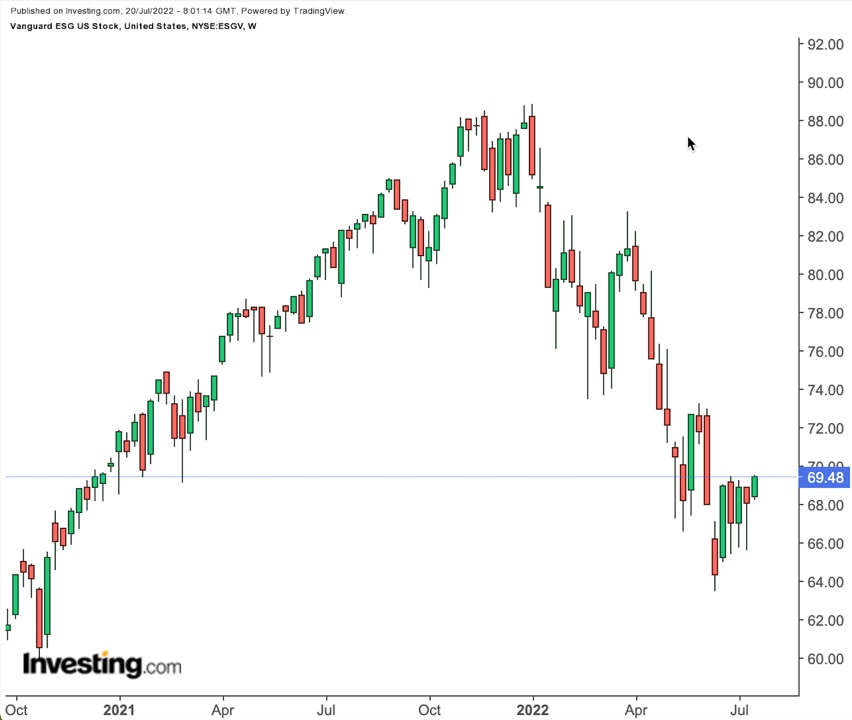Gold prices slide further as easing US-China tensions curb haven demand
- ESG investing had been gaining popularity
- Recent market slump has tested investor's commitment
- But sector has outperformed major benchmarks YTD
ESG investing, or buying shares of companies that follow strict environmental, social, and governance practices, has gained popularity in recent years. Global ESG assets, valued at $35 trillion at the start of 2021, are expected to “exceed $41 trillion by 2022 and $50 trillion by 2025.”
Meanwhile, the onset of a bear market, driven by surging interest rates and an economic slowdown this year, is testing investors' sustainability commitments. Mutual funds and exchange-traded funds (ETFs) with an ESG focus registered an outflow of $3.5 billion—the first decline in more than three years.
The S&P ESG Global Macro Index declined 8% so far this year. By comparison, the S&P Global 100 index has lost more than 17% since January. Meanwhile, on Wall Street, benchmark indices—the S&P 500 and the heavy-tech NASDAQ 100—are down roughly 17.5% and 25%, respectively.
A recent survey highlights that:
“ESG funds are among the top five investments respondents are currently using.”
In addition, 27% of respondents who work with clients plan to increase their usage within the year.
Today we introduce two ESG-focused ETFs that deserve readers’ attention in Q3.
1. Nuveen ESG Large-Cap Value ETF
- Current Price: $33.95
- 52-Week Range: $32.19 - $40.06
- Dividend Yield: 1.89%
- Expense Ratio: 0.25% per year
According to Deloitte:
“ESG-mandated assets are projected to make up half of all professionally managed assets globally by 2024.”
Our first fund is the Nuveen ESG Large-Cap Value ETF (NYSE:NULV), which invests in U.S. large-caps that offer fundamental value, while adhering to predetermined ESG criteria. The fund started trading in December 2016.
NULV, which follows the returns of the TIAA ESG USA Large-Cap Value Index, holds a basket of 105 stocks. In terms of sector allocations, we see financials (17.9%), health care (17.3%), information technology (13.4%), industrials (12.2%), and consumer staples (12%) among others.
The top 10 stocks account for almost a quarter of $1.4 billion in net assets. Leading names include Procter & Gamble (NYSE:PG), Coca-Cola (NYSE:KO), PepsiCo (NASDAQ:PEP); Merck (NYSE:MRK), and Verizon Communications (NYSE:VZ).
NULV hit a record-low on June 17 and is down around 12.6% so far this year. The fund’s trailing price-to-earnings (P/E) and price-to-book (P/B) ratios are 13.72x and 2.33x. Long-term investors looking for U.S. stocks that offer value and follow ESG principles could consider researching NULV further.
2. Vanguard ESG U.S. Stock ETF
- Current Price: $69.48
- 52-Week Range: $63.48 - $88.85
- Dividend Yield: 1.31%
- Expense Ratio: 0.09% per year
Readers are likely to note technology companies often comprise a significant slice of many ESG funds. According to a KMPG study, more than a quarter of tech names have made ESG principles part of their business operations. Meanwhile, 45% are working “to link their growth strategy with a wider societal purpose”.
The Vanguard ESG US Stock ETF (NYSE:ESGV) was launched in September 2018. It specifically excludes several segments, such as adult entertainment, alcohol, cannabis, tobacco, gambling, all kinds of weapons and munitions, nuclear power, and fossil fuels.
ESGV tracks the returns of the FTSE US All Cap Choice Index and has 1514 holdings. Close to a third of the ETF is in the top 10 stocks.
Among them are Apple (NASDAQ:AAPL), Microsoft (NASDAQ:MSFT), Alphabet (NASDAQ:GOOGL), Tesla (NASDAQ:TSLA), and UnitedHealth (NYSE:UNH).
Companies from the technology sector account for more than 30% of the portfolio. Next are names from health care (15.7%), consumer discretionary (15.4%), financials (11.3%), and industrials (10.6%).
ESGV is down more than 20.8% since January and almost 16% over the past 12 months. It saw a 52-week low on June 16. Trailing P/E and P/B ratios stand at 18.4x and 3.6x. The fund offers a potentially low-cost option for ESG-screened U.S. equities, especially for a number of beaten-down tech stocks.
Disclaimer: On the date of publication, Tezcan Gecgil, Ph.D., did not have any positions in the securities mentioned in this article.
